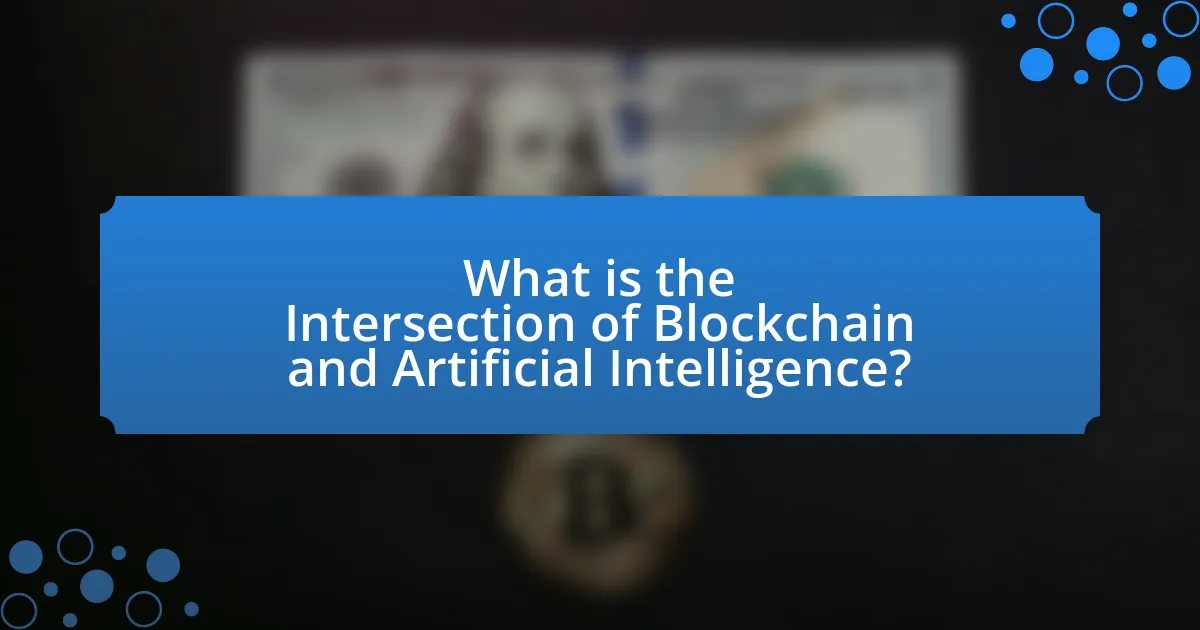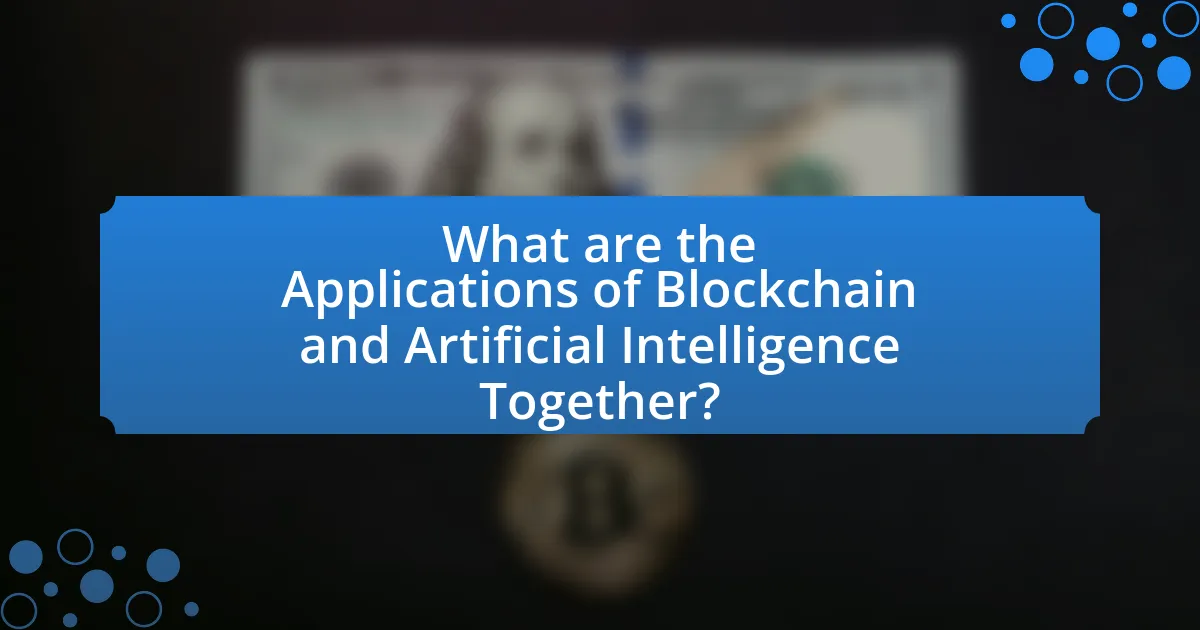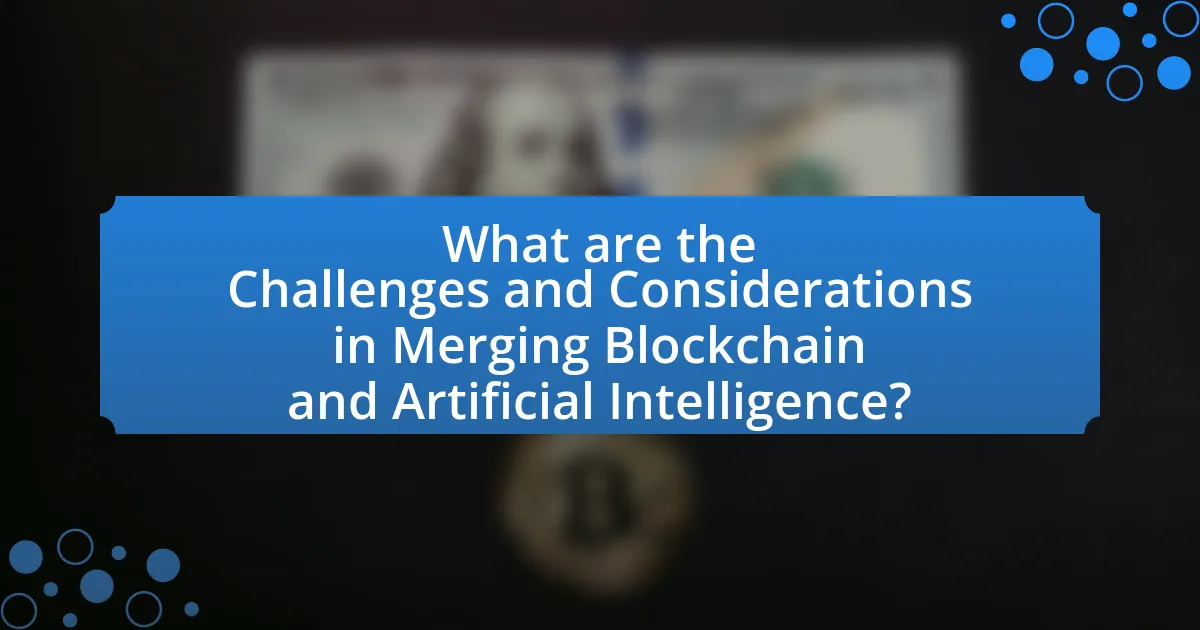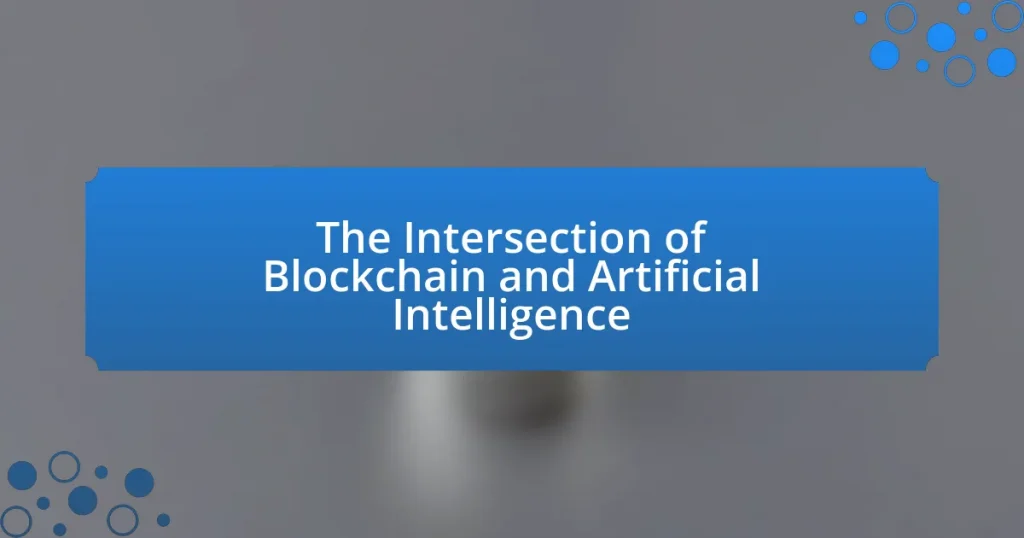The main entity of the article is the intersection of blockchain and artificial intelligence (AI). This article explores how the integration of these two technologies enhances data security, transparency, and decision-making processes across various industries. It discusses the fundamental principles of blockchain, core concepts of AI, and their complementary roles in improving operational efficiency and data integrity. Additionally, the article addresses the challenges and ethical considerations associated with merging these technologies, while highlighting innovative applications in sectors such as finance, healthcare, and supply chain management. Key strategies for successful integration and collaboration between blockchain and AI teams are also outlined.

What is the Intersection of Blockchain and Artificial Intelligence?
The intersection of blockchain and artificial intelligence (AI) involves the integration of decentralized data management with intelligent algorithms to enhance data security, transparency, and decision-making processes. Blockchain provides a secure and immutable ledger for storing data, which can be utilized by AI systems to ensure the integrity of the information they analyze. For instance, AI can leverage blockchain to access verified datasets, improving the accuracy of machine learning models. Additionally, AI can optimize blockchain operations by enhancing transaction speeds and automating smart contracts. This synergy is evidenced by projects like SingularityNET, which combines AI services on a blockchain platform, demonstrating practical applications of their convergence.
How do Blockchain and Artificial Intelligence complement each other?
Blockchain and Artificial Intelligence (AI) complement each other by enhancing data security and improving decision-making processes. Blockchain provides a decentralized and immutable ledger that ensures data integrity, which is crucial for AI systems that rely on accurate data for training and predictions. For instance, AI algorithms can analyze data stored on a blockchain to derive insights while benefiting from the trustworthiness of that data. Additionally, AI can optimize blockchain operations by improving transaction speeds and automating processes through smart contracts. This synergy is evident in applications such as supply chain management, where blockchain secures data provenance, and AI analyzes patterns to enhance efficiency.
What are the fundamental principles of Blockchain technology?
The fundamental principles of Blockchain technology are decentralization, transparency, immutability, and consensus. Decentralization ensures that no single entity controls the entire network, allowing for distributed control among participants. Transparency allows all transactions to be visible to network participants, fostering trust. Immutability guarantees that once data is recorded on the blockchain, it cannot be altered or deleted, ensuring data integrity. Consensus mechanisms, such as Proof of Work or Proof of Stake, validate transactions and maintain the integrity of the blockchain by requiring agreement among participants before changes are made. These principles collectively enhance security and reliability in digital transactions.
What are the core concepts of Artificial Intelligence?
The core concepts of Artificial Intelligence include machine learning, natural language processing, computer vision, robotics, and expert systems. Machine learning enables systems to learn from data and improve over time, as demonstrated by algorithms that can predict outcomes based on historical data. Natural language processing allows machines to understand and interpret human language, facilitating interactions between humans and computers. Computer vision involves enabling machines to interpret and make decisions based on visual data, which is crucial in applications like facial recognition. Robotics combines AI with physical machines to perform tasks autonomously, while expert systems use knowledge bases to solve complex problems in specific domains. These concepts are foundational to the development and application of AI technologies across various industries.
Why is the intersection of Blockchain and Artificial Intelligence significant?
The intersection of Blockchain and Artificial Intelligence is significant because it enhances data security and integrity while enabling decentralized decision-making. Blockchain provides a secure and immutable ledger for AI-generated data, ensuring that the information used for training algorithms is trustworthy. For instance, a study by the World Economic Forum highlights that combining these technologies can improve transparency in AI systems, reducing biases and increasing accountability. This synergy allows organizations to leverage AI’s analytical capabilities while maintaining the reliability of data through blockchain’s decentralized architecture.
What challenges do traditional systems face that these technologies can address?
Traditional systems face challenges such as data security vulnerabilities, inefficiencies in data processing, and lack of transparency. Blockchain technology can address these issues by providing a decentralized and secure method for data storage, which enhances security through cryptographic techniques. Additionally, artificial intelligence can optimize data processing by automating tasks and improving decision-making through advanced analytics. For instance, a study by the World Economic Forum highlights that integrating blockchain with AI can reduce operational costs by up to 30% by streamlining processes and enhancing data integrity.
How can the integration of these technologies enhance security and transparency?
The integration of blockchain and artificial intelligence enhances security and transparency by providing immutable data records and enabling real-time data analysis. Blockchain’s decentralized ledger ensures that all transactions are securely recorded and cannot be altered, which reduces the risk of fraud and unauthorized access. For instance, a study by the World Economic Forum highlights that blockchain can improve supply chain transparency by allowing all parties to verify the authenticity of products in real-time. Additionally, AI can analyze vast amounts of data on the blockchain to detect anomalies and potential security threats, thereby enhancing overall system integrity. This combination not only fosters trust among users but also streamlines processes by ensuring that all data is accurate and verifiable.

What are the Applications of Blockchain and Artificial Intelligence Together?
The applications of blockchain and artificial intelligence together include enhanced data security, improved supply chain management, and more efficient healthcare systems. Blockchain provides a decentralized and immutable ledger that ensures data integrity, while AI algorithms analyze this data for insights. For instance, in supply chain management, companies like IBM and Maersk utilize blockchain to track goods in real-time, enhancing transparency and reducing fraud. In healthcare, AI can analyze patient data stored on blockchain to improve diagnostics and treatment plans, as seen in projects like MedRec, which integrates blockchain for secure patient data management. These applications demonstrate how the synergy between blockchain and AI can lead to innovative solutions across various industries.
How is this intersection being utilized in various industries?
The intersection of blockchain and artificial intelligence (AI) is being utilized in various industries to enhance data security, improve decision-making, and streamline operations. In the finance sector, blockchain provides secure transaction records while AI analyzes data patterns for fraud detection, leading to a 50% reduction in fraudulent activities according to a report by Accenture. In healthcare, blockchain ensures the integrity of patient records, while AI algorithms assist in diagnostics, improving accuracy by up to 30% as noted in a study published in the Journal of Medical Internet Research. The supply chain industry benefits from blockchain’s transparency and traceability, combined with AI’s predictive analytics, resulting in a 20% increase in operational efficiency, as reported by McKinsey. These applications demonstrate the significant impact of integrating blockchain and AI across multiple sectors.
What role does this integration play in finance and banking?
The integration of blockchain and artificial intelligence (AI) plays a crucial role in enhancing security, efficiency, and transparency in finance and banking. Blockchain technology provides a decentralized and immutable ledger, which ensures that all transactions are securely recorded and can be verified without the need for intermediaries. AI, on the other hand, analyzes vast amounts of data to identify patterns, improve decision-making, and automate processes. For instance, AI algorithms can detect fraudulent activities in real-time by analyzing transaction data on the blockchain, thereby reducing risks and enhancing compliance. This synergy not only streamlines operations but also fosters trust among stakeholders, as evidenced by the increasing adoption of these technologies by major financial institutions to improve customer service and operational efficiency.
How can healthcare benefit from combining Blockchain and Artificial Intelligence?
Healthcare can benefit from combining Blockchain and Artificial Intelligence by enhancing data security, improving patient outcomes, and streamlining operations. Blockchain provides a secure and immutable ledger for storing patient records, ensuring data integrity and privacy, while AI can analyze this data to identify patterns and predict health trends. For instance, a study published in the Journal of Medical Internet Research highlights that integrating AI with Blockchain can facilitate secure sharing of medical data, which can lead to more accurate diagnoses and personalized treatment plans. This combination not only protects sensitive information but also empowers healthcare providers with actionable insights, ultimately leading to improved patient care and operational efficiency.
What innovative solutions are emerging from this intersection?
Innovative solutions emerging from the intersection of blockchain and artificial intelligence include decentralized data marketplaces, enhanced security protocols for AI models, and improved transparency in AI decision-making processes. Decentralized data marketplaces enable individuals to securely share and monetize their data while maintaining control over it, leveraging blockchain’s immutable ledger for trust. Enhanced security protocols utilize blockchain to create tamper-proof records of AI training data, ensuring the integrity and provenance of the datasets used. Additionally, blockchain facilitates transparency in AI by providing auditable trails of decision-making processes, which can help mitigate biases and increase accountability in AI applications. These solutions are being developed and implemented across various sectors, including finance, healthcare, and supply chain management, demonstrating their practical relevance and potential impact.
How are smart contracts enhanced by Artificial Intelligence?
Artificial Intelligence enhances smart contracts by automating decision-making processes and improving contract execution efficiency. AI algorithms can analyze vast amounts of data to predict outcomes, assess risks, and optimize contract terms based on real-time information. For instance, AI can facilitate dynamic contract adjustments based on changing conditions, such as market fluctuations or compliance requirements, thereby increasing the adaptability and reliability of smart contracts. This integration leads to reduced transaction costs and faster processing times, as evidenced by studies showing that AI-driven smart contracts can decrease operational inefficiencies by up to 30%.
What are the implications for supply chain management?
The implications for supply chain management at the intersection of blockchain and artificial intelligence include enhanced transparency, improved efficiency, and increased security. Blockchain technology provides a decentralized ledger that ensures all transactions are recorded transparently, allowing stakeholders to trace the origin and movement of goods in real-time. This transparency reduces fraud and errors, as all parties have access to the same information.
Artificial intelligence further optimizes supply chain processes by analyzing vast amounts of data to predict demand, optimize inventory levels, and streamline logistics. For instance, AI algorithms can forecast demand patterns, enabling companies to adjust their supply chains proactively. According to a report by McKinsey, companies that leverage AI in supply chain management can reduce operational costs by up to 20%.
Together, these technologies create a more resilient supply chain capable of responding swiftly to disruptions, ultimately leading to better customer satisfaction and competitive advantage.

What are the Challenges and Considerations in Merging Blockchain and Artificial Intelligence?
The challenges and considerations in merging blockchain and artificial intelligence include scalability, data privacy, and interoperability. Scalability issues arise because blockchain networks often struggle to handle the high transaction volumes required by AI applications, which can lead to delays and inefficiencies. Data privacy is a significant concern, as AI systems require large datasets for training, and integrating these with blockchain can expose sensitive information unless robust encryption methods are employed. Interoperability challenges exist because different blockchain platforms and AI systems may not easily communicate or share data, complicating integration efforts. These challenges highlight the need for innovative solutions to effectively combine these technologies while ensuring security and efficiency.
What technical hurdles must be overcome for successful integration?
Successful integration of blockchain and artificial intelligence requires overcoming several technical hurdles, including interoperability, scalability, and data privacy. Interoperability challenges arise from the need for different blockchain platforms and AI systems to communicate effectively, which is crucial for seamless data exchange and functionality. Scalability issues must be addressed to ensure that both blockchain networks can handle the high volume of transactions and data processing required by AI applications. Data privacy concerns are paramount, as integrating AI with blockchain necessitates secure handling of sensitive information, which can be difficult given the transparent nature of blockchain technology. These hurdles must be systematically addressed to achieve effective integration of these two advanced technologies.
How do scalability issues affect the deployment of these technologies together?
Scalability issues significantly hinder the deployment of blockchain and artificial intelligence technologies together by limiting their ability to process large volumes of data efficiently. Blockchain networks often face challenges in transaction throughput and latency, which can restrict the speed at which AI algorithms can access and analyze data stored on the blockchain. For instance, Ethereum, a widely used blockchain platform, can handle approximately 30 transactions per second, while AI applications may require thousands of transactions per second to function effectively in real-time scenarios. This mismatch in processing capabilities can lead to bottlenecks, reducing the overall effectiveness of integrated solutions. Furthermore, the decentralized nature of blockchain can complicate the scalability of AI models that rely on centralized data processing, making it difficult to achieve the necessary computational power for complex AI tasks.
What are the data privacy concerns associated with this intersection?
Data privacy concerns at the intersection of blockchain and artificial intelligence include the potential for unauthorized data access and the challenge of ensuring data anonymity. Blockchain’s immutable nature means that once data is recorded, it cannot be altered or deleted, which raises issues regarding the right to be forgotten under data protection regulations like GDPR. Additionally, AI systems often require large datasets for training, which can lead to the aggregation of personal data, increasing the risk of exposure. A study by the European Union Agency for Cybersecurity highlights that the combination of these technologies can create vulnerabilities if not properly managed, as AI can analyze blockchain data to identify individuals, undermining privacy.
What ethical considerations arise from combining Blockchain and Artificial Intelligence?
Combining Blockchain and Artificial Intelligence raises several ethical considerations, primarily concerning data privacy, accountability, and bias. Data privacy issues arise because Blockchain’s transparency can conflict with the need for confidentiality in AI data usage, potentially exposing sensitive information. Accountability becomes a concern as the decentralized nature of Blockchain complicates the attribution of responsibility for AI decisions, especially in cases of errors or harm. Additionally, bias in AI algorithms can be exacerbated by the data stored on Blockchain, as historical biases may be perpetuated if not properly managed. These ethical considerations highlight the need for frameworks that ensure responsible integration of these technologies.
How can bias in AI algorithms impact Blockchain applications?
Bias in AI algorithms can significantly impact Blockchain applications by leading to unfair decision-making processes and skewed data interpretations. When AI systems, which may be integrated into Blockchain for tasks like smart contract execution or data analysis, are biased, they can produce outcomes that favor certain groups over others, undermining the principle of transparency and fairness inherent in Blockchain technology. For instance, if an AI algorithm used for credit scoring in a Blockchain-based lending platform is biased against specific demographics, it can result in discriminatory lending practices, violating ethical standards and potentially leading to legal repercussions. This effect is compounded by the immutable nature of Blockchain, where biased decisions become permanent records, making it difficult to rectify injustices.
What measures can be taken to ensure responsible use of these technologies?
To ensure responsible use of blockchain and artificial intelligence technologies, implementing robust regulatory frameworks is essential. These frameworks should include guidelines for ethical AI development, data privacy protections, and accountability measures for blockchain transactions. For instance, the European Union’s General Data Protection Regulation (GDPR) sets a precedent for data protection that can be adapted to govern AI and blockchain applications, ensuring user consent and data security. Additionally, promoting transparency in algorithms and blockchain processes can help mitigate biases and enhance trust among users. Research indicates that organizations adopting ethical guidelines in AI development see a 30% increase in stakeholder trust, highlighting the importance of responsible practices in technology deployment.
What best practices should be followed when implementing Blockchain and Artificial Intelligence solutions?
When implementing Blockchain and Artificial Intelligence solutions, organizations should prioritize data integrity, interoperability, and scalability. Ensuring data integrity involves using Blockchain’s immutable ledger to secure AI training data, which enhances the reliability of AI models. Interoperability is crucial as it allows different Blockchain networks and AI systems to communicate effectively, facilitating seamless integration and data sharing. Scalability must be addressed to handle increasing data volumes and transaction speeds, ensuring that the combined solutions can grow with organizational needs.
For instance, a study by Accenture highlights that 83% of executives believe that Blockchain can enhance AI by providing trustworthy data, which supports the importance of data integrity. Additionally, the integration of these technologies can lead to more efficient processes, as evidenced by IBM’s research indicating that 70% of organizations see improved operational efficiency through such implementations.
How can organizations effectively assess their readiness for integration?
Organizations can effectively assess their readiness for integration by conducting a comprehensive evaluation of their existing infrastructure, processes, and workforce capabilities. This assessment should include analyzing current technology stacks, identifying gaps in skills and knowledge, and evaluating organizational culture towards change. For instance, a study by McKinsey & Company highlights that organizations with a clear digital strategy and skilled workforce are 2.5 times more likely to succeed in technology integration. Additionally, utilizing frameworks such as the Capability Maturity Model can provide structured insights into an organization’s readiness level, enabling targeted improvements.
What strategies can enhance collaboration between Blockchain and AI teams?
Enhancing collaboration between Blockchain and AI teams can be achieved through integrated project management tools that facilitate real-time communication and data sharing. These tools, such as Jira or Trello, allow both teams to track progress, assign tasks, and manage workflows efficiently. Additionally, establishing cross-functional teams that include members from both Blockchain and AI backgrounds fosters a culture of collaboration and innovation, as diverse perspectives lead to more comprehensive solutions. Regular joint workshops and brainstorming sessions can also stimulate creative problem-solving and align objectives, ensuring that both teams work towards common goals. Research indicates that organizations employing cross-disciplinary collaboration see a 20% increase in project success rates, highlighting the effectiveness of these strategies.


